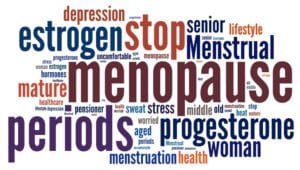Written by Taylor Woosley, Staff Writer. Eight-week supplementation with 500 mg Rheum ribes twice a day significantly decreased the mean of hot flashing in the Blatt-Kupperman index four- and eight-weeks post intervention (p< 0.001).
 Menopause occurs naturally in most women between ages 45 and 52 years and is marked by changes in hormonal status and the cessation of the menstrual cycle1. Many women experience numerous problems, such as sleep disorders, psychotic symptoms, anxiety, pulse increases, cardiovascular disease, osteoporosis, and sexual disorders2. Furthermore, vasomotor symptoms, or hot flashes and night sweats, are hallmarks of the menopausal transition and can significantly affect quality of life3.
Menopause occurs naturally in most women between ages 45 and 52 years and is marked by changes in hormonal status and the cessation of the menstrual cycle1. Many women experience numerous problems, such as sleep disorders, psychotic symptoms, anxiety, pulse increases, cardiovascular disease, osteoporosis, and sexual disorders2. Furthermore, vasomotor symptoms, or hot flashes and night sweats, are hallmarks of the menopausal transition and can significantly affect quality of life3.
Phytochemical research has shown that rhubarb seeds contain high levels of amino acids and polysaccharides which possess a wide range of antioxidant and anti-inflammatory biological activities4. Components of rhubarb have been reported to bind to estrogen receptors Erα and Erβ, but the hormone-like activity of the plant has been hitherto demonstrated using only in vitro experimental models5. Additionally, previous research has shown that a standard rhubarb extract (ERr 731) effectively decreased the number and severity of hot flashes6.
Bagheriani et al. conducted a randomized double-blind, placebo-controlled study to investigate the effects of Rheum ribes (rhubarb) on hot flashes in menopausal women. Inclusion criteria consisted of being a woman aged 45 years or over, who are not on hormonal medication, who have not menstruated in the past 12 months, and have no serious medical illness. Subjects were divided into the rhubarb group and the control group. Those in the rhubarb group received 500 mg capsules one hour after a meal twice a day for eight weeks and the control received a placebo containing 500 mg starch powder. Participants were evaluated at the beginning of the study, and four and eighth weeks after the intervention.
Primary outcome measurements consisted of the severity of hot flashes measured with Blatt-Kupperman index. 74 subjects completed the study, with 39 women in the rhubarb group and 35 participants in the placebo group. Independent t-test showed no significant differences between the two groups in terms of the parameters in demographic characteristics (p > 0.05), only the mean age at menopause in the rhubarb group was significantly higher than the placebo group (p < 0.001). Study findings show that rhubarb significantly decreased the mean of flashing in Blatt-Kupperman index four- and eight-weeks post-intervention (p < 0.001). Furthermore, comparison of other variables of the Blatt-Kupperman index in the post-intervention showed a significant difference between the two groups in terms of variables of depression and dizziness.
Results of the study suggest that treatment with Rheum ribes (rhubarb) can effectively be used as an adjunctive treatment for hot flashes in subjects experiencing menopause. Further research should continue to explore the effects of rhubarb on symptoms of hot flashes and night sweats. Study limitations include available sampling, sample dropout, and per protocol analysis.
Source: Bagheriani, Najmeh, Mohsen Bahrami, Mohammad Kamalinejad, Zahra Rampisheh, Maryam Kashanian, and Elham Akhtari. “The Effect of Rheum ribes Root (Rhubarb) on Menopausal Hot Flashes: a Randomized Double-Blind, Placebo-Controlled Trial.” Res J Pharmacogn 10, no. 1 (2023): 41-50.
© 2023. Open access. This article is distributed under the terms of the Creative Commons Attribution 4.0 International License (https://creativecommons.org/licenses/by-nc/4.0/)
Click here to read the full text study.
Posted April 17, 2023.
Taylor Woosley studied biology at Purdue University before becoming a 2016 graduate of Columbia College Chicago with a major in Writing. She currently resides in Glen Ellyn, IL.
References:
- Johnson A, Roberts L, Elkins G. Complementary and Alternative Medicine for Menopause. J Evid Based Integr Med. Jan-Dec 2019;24:2515690×19829380. doi:10.1177/2515690×19829380
- Kheirkhah M, Naieri SD, Tabari NS. The effect of herbal tea capsule on menopause hot flashes. Journal of family medicine and primary care. Sep-Oct 2018;7(5):1074-1078. doi:10.4103/jfmpc.jfmpc_332_17
- Avis NE, Crawford SL, Green R. Vasomotor Symptoms Across the Menopause Transition: Differences Among Women. Obstetrics and gynecology clinics of North America. Dec 2018;45(4):629-640. doi:10.1016/j.ogc.2018.07.005
- Wang L, Xiong F, Zhao S, Yang Y, Zhou G. Network pharmacology combined with molecular docking to explore the potential mechanisms for the antioxidant activity of Rheum tanguticum seeds. BMC complementary medicine and therapies. May 3 2022;22(1):121. doi:10.1186/s12906-022-03611-3
- Liudvytska O, Kolodziejczyk-Czepas J. A Review on Rhubarb-Derived Substances as Modulators of Cardiovascular Risk Factors-A Special Emphasis on Anti-Obesity Action. Nutrients. May 13 2022;14(10)doi:10.3390/nu14102053
- Wilson M, Konda V, Heidt K, Rathinasabapathy T, Desai A, Komarnytsky S. Rheum rhaponticum Root Extract Improves Vasomotor Menopausal Symptoms and Estrogen-Regulated Targets in Ovariectomized Rat Model. Int J Mol Sci. Jan 21 2021;22(3)doi:10.3390/ijms22031032
